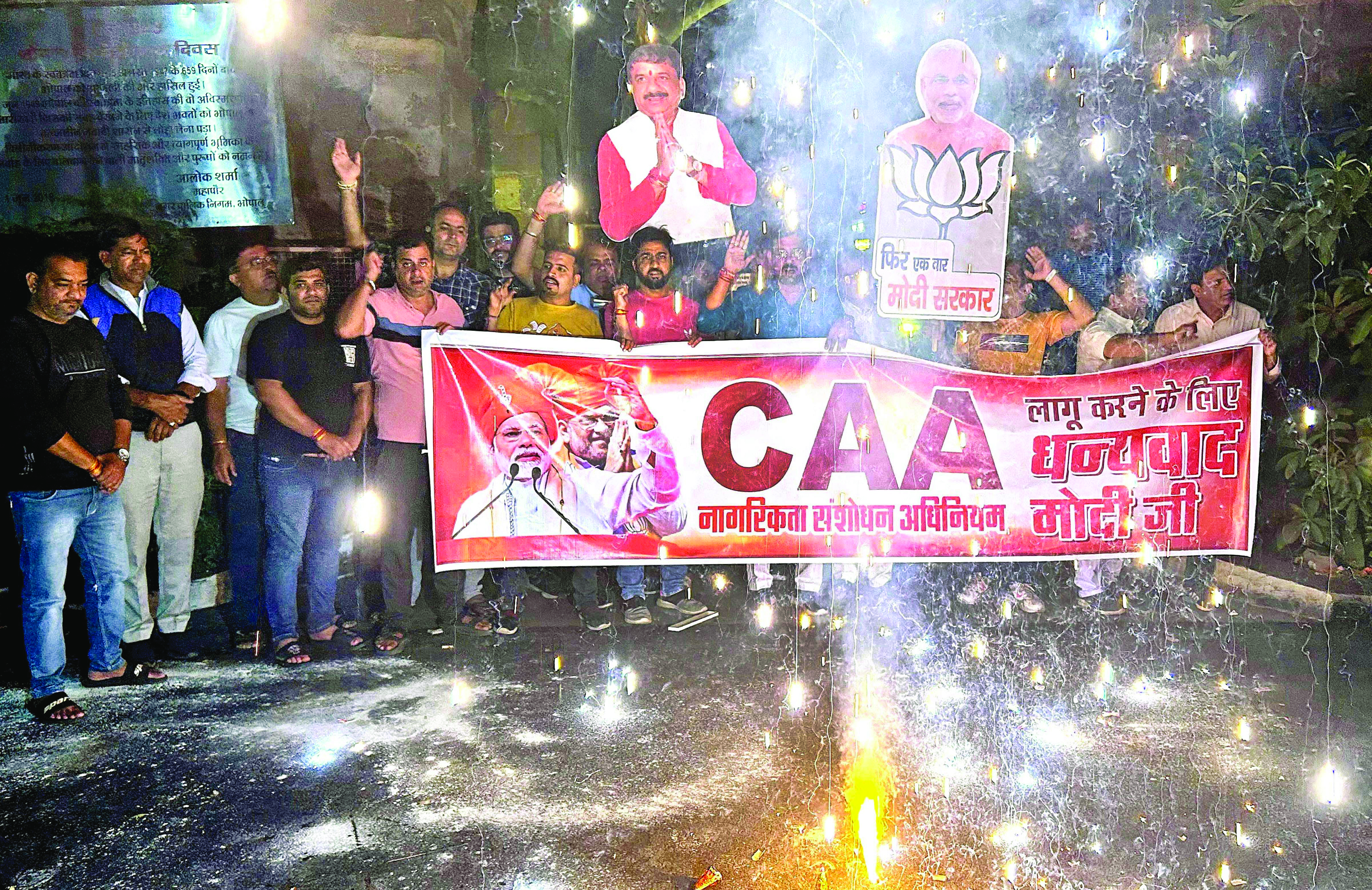Govt implements CAA, clears path for granting citizenship

NEW DELHI: Weeks ahead of the 2024 Lok Sabha elections, the Centre on Monday implemented the Citizenship (Amendment) Act, 2019 (CAA-2019), which was cleared by Parliament nearly four years ago. The notification of the rules, known as the Citizenship (Amendment) Rules, 2024, will allow individuals eligible under CAA-2019 to apply for Indian citizenship.
The Citizenship Amendment Act, which received presidential assent on December 12, 2019, aims to provide a pathway to Indian citizenship for migrants from Hindu, Sikh, Buddhist, Jain, Parsi, or Christian communities who arrived in India on or before December 31, 2014 from Afghanistan, Bangladesh, and Pakistan. Notably, the CAA-2019 amends Section 2 of the Citizenship Act of 1955, introducing new provisions for “illegal migrants.” The CAA-2019 sparked widespread protests in February 2020, leading to a delay in the framing and notification of the accompanying rules. The law evoked wide criticism and was dubbed as ‘anti-Muslim’. It also came under scrutiny from various platforms, including the United Nations.
Union Home minister Amit Shah, meanwhile, said Prime Minister Narendra Modi has delivered on another commitment and realised the promise of the makers of the Constitution.
Under the newly notified rules applications for citizenship will be submitted through a dedicated online portal. New rules provide a structured and simplified approach for individuals applying for Indian citizenship under these sub-categories: a person of Indian origin, a person who is married to an Indian citizen, minor child of an Indian citizen, a person having Indian parents, a person who or either of his parents was a citizen of independent India, a person who is registered as an Overseas Citizen of India cardholder and a person seeking citizenship by naturalisation.
Each category has a designated form (IIA, IIIA, IVA, VA, VIA, VIIA, and VIIIA) and conditions outlined in the rules.
According to the newly notified rules, individuals seeking Indian citizenship under the Citizenship (Amendment) Act, 2019, must have resided in India for at least 12 months prior to their application date. Additionally, during the eight years immediately preceding the 12 months, the applicants will have to spend not less than six years in the country to be eligible to get the India citizenship. In the language proficiency section, applicants are required to declare their adequate knowledge of one language specified in the Eighth Schedule to the Constitution. Proficiency can be demonstrated through speaking, reading, or writing the language.
Regarding declaration and documents, every application must include a declaration confirming the irrevocable renouncement of citizenship from the applicant’s country in the event of approval. No claims on the renounced citizenship can be raised in the future. Accompanying documents include copies specified in Schedule IA and Schedule IB, along with an affidavit in the format specified in Schedule IC.
Applicants are required to provide a copy of their valid or expired foreign passport, residential permit, proof of their spouse’s Indian nationality, or a copy of their marriage certificate issued by the Registrar of Marriage, as applicable. However, these documents are not mandatory and should be provided “if available”.
In the electronic application process, applicants under section 6B are required to submit their applications electronically to the Empowered Committee through the designated District Level Committee. During the verification process, the District Level Committee, headed by a Designated Officer, will verify documents submitted by the applicant along with the application. The Designated Officer will administer the oath of allegiance to the applicant, as specified in the Second Schedule to the Citizenship Act, 1955, and forward the signed oath and verification confirmation electronically to the Empowered Committee.
In the Empowered Committee scrutiny, the committee will scrutinise applications to ensure completeness and that applicants meet all conditions laid down in section 6B. After a thorough inquiry, the committee may grant citizenship if the applicant is deemed a fit and proper person.
In digital certificate issuance, every person registered as a citizen under section 6B will receive a digital certificate of registration (Form XA or XIA), issued by the Chairman of the Empowered Committee. Similarly, individuals gaining citizenship by naturalisation will receive a digital certificate of naturalisation (Form XIIA).
Inclusion in Rule 17 is amended to include references to section 6B, ensuring clarity in the application of the rules. In the oath of allegiance in Section 38, a new sub-rule (3) is added, specifying that in applications submitted under Section 6B, the oath of allegiance must be signed in the presence of or administered by the Designated Officer as specified in Rule 11A.
While the law has faced criticism for excluding the Muslim community, the government asserted that it does not infringe upon the legal, democratic, or secular rights of any Indian citizens. Despite numerous petitions challenging the law and claims of religious discrimination, the Supreme Court, in January 2020, issued notices without staying the Act. Official sources said CAA-2019 is a law to give citizenship and will not take away citizenship of any Indian irrespective of their religion, adding it is only for those who have suffered persecution for years and have no other shelter in the world except India.
Many misconceptions have been spread regarding the CAA, they said.
“The citizenship rights will protect their cultural, linguistic, and social identity and it will also ensure economic, commercial, free movement, and property purchase rights,” they added.



